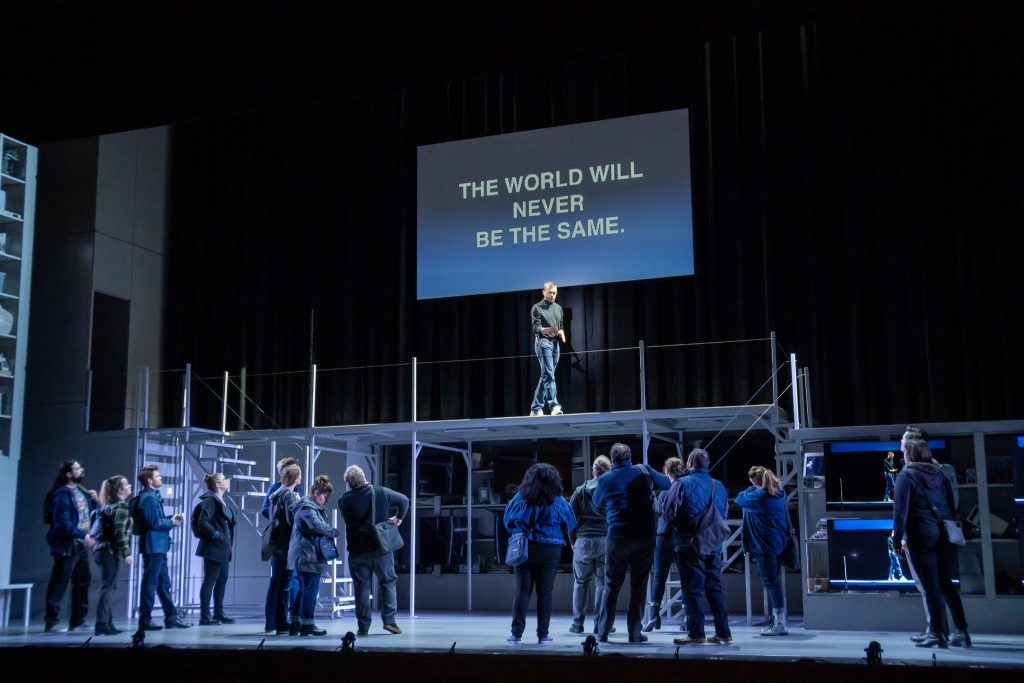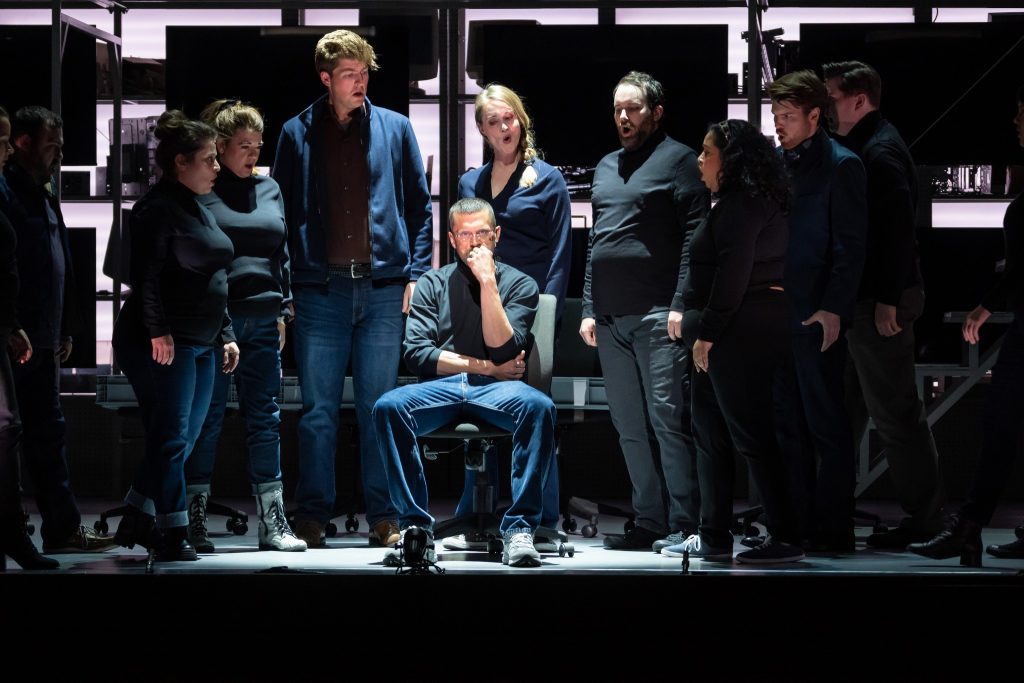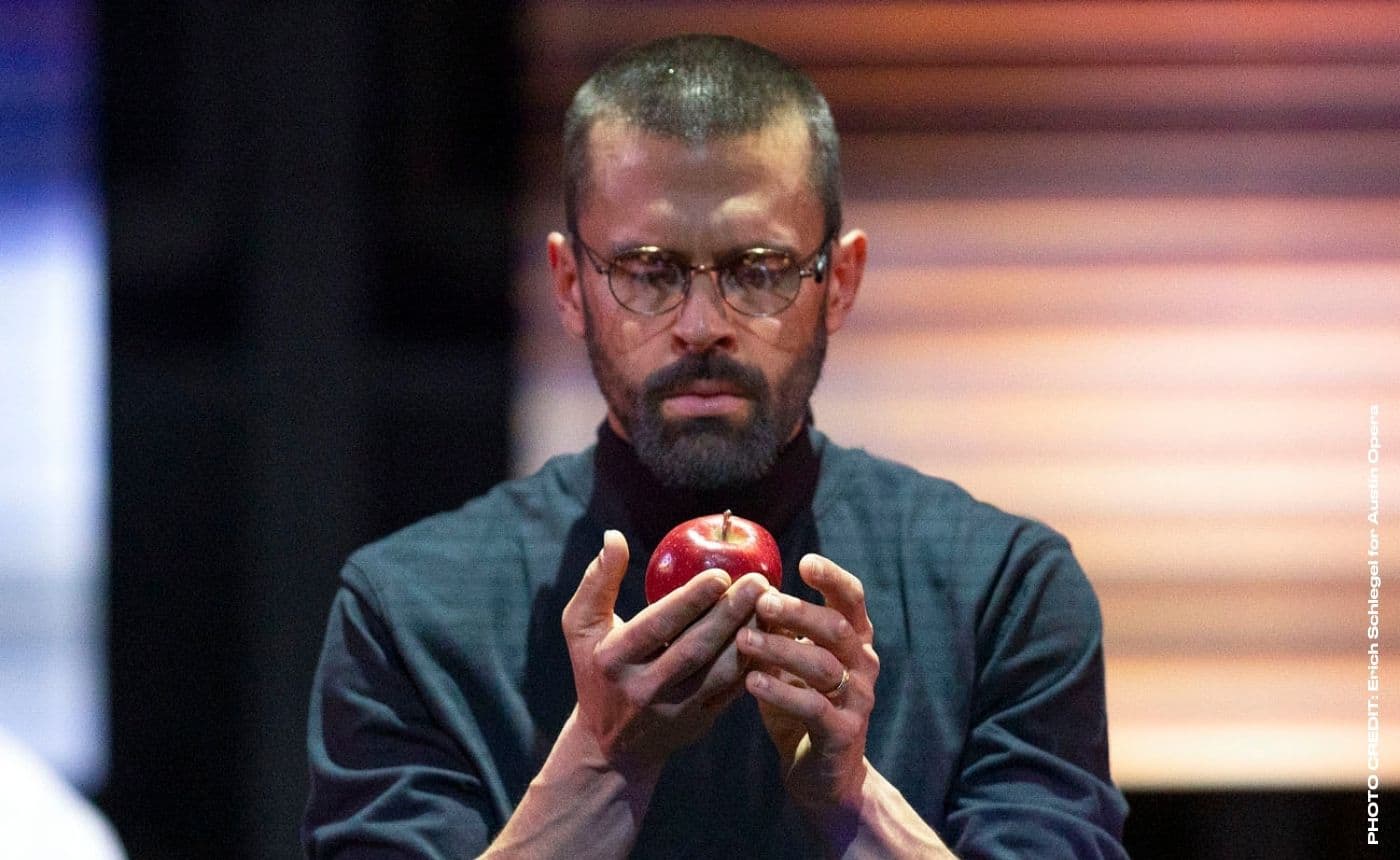By Kathryn Olsen
The (R)evolution of Steve Jobs, the Utah Opera production that closes the 2022-2023 at Salt Lake City‘s Capitol Theatre, is a novel jewel in the repertoire available to the Utah community, as seen by Front Row Reviewers. This English language bio-opera by Mason Bates with a libretto by Mark Campbell was awarded the Grammy for Best Opera Recording in 2018 and its appeal is immediate for the audience. The program admits that, while it is inspired by the life of Steve Jobs, it does not purport to be accurate to life. It is, however, an exploration of circumstances around such things as Jobs’ technical innovation and his strife within his own company. It also depicts his associates–Steve Wozniak, Paul Jobs, Laurene Powell Jobs, Chrisann Brennan, and Kobun Chino Otogawa. I could not resist the chance to see such a forward-thinking work, particularly as my brother works for Apple, the brainchild of the titular character.

As the opera opens, Paul Jobs (Stephen Pace) reveals his son Steve’s (Declan Morrissey) birthday present, a workbench that he describes as “a fine place to start.” The story then fast-forwards forty-two years to the launch of “one device” to do everything, charismatically presented by the now-adult Steve Jobs (John Moore), who announces the revolutionary iPhone. In the wake of this announcement, he collapses to the stage and is later chided by his wife Laurene (Sarah Coit) for not taking care of himself. While walking later that day, he encounters the spirit of his mentor, Kobun Chino Otogawa (Wei Wu), who guides Steve into a meditation on the life he has lived so far. The remainder of the opera chronicles his journey from a student of calligraphy to a man ousted by his own board of directors to a repentant man who finds true love. There are times when it seems similar to Dante Alighieri’s Divine Comedy, with the dying Jobs being guided by his long-time Buddhist mentor to spiritual enlightenment through encounters with those he knew in life.
Moore as Jobs is riveting as he slips from one stage of life to another seemingly without effort. He is as completely immersed while the young man who cracks up at the prank calls of his colleague Steve Wozniak (Bille Bruley) as when he is on the verge of a breakdown just prior to their falling out and professional parting in 1986. The scene of his own memorial in which he is still exhibiting his perfectionist tendencies towards the way he is remembered, is both mildly comical and movingly reflective of his quest for greatness. My favorite aspect of Moore’s performance was the range of vocal stylings, since it demanded youthful rock and roll as well as operatic technique. As Steve spends a great deal of time telling the story personally, the vocal stamina of Moore is phenomenal, while the choreography demands a man who is both able to move at the speed of thought and be still at times.

Bruley plays an understandably more background role as Wozniak, but brings a joyful stage presence to the production. It is so pronounced that his falling out with Jobs during the 1980s is one of the most harrowing scenarios that are staged. Bruley brings Wozniak to larger-than-life at times, which lends itself marvelously to the moments where he stands up for himself and his contributions. His voice is one of the most carrying of the entire cast and very effective.
If the audience sees shades of Dante in the storyline, Coit’s Laurene is a Beatrice figure who is both a challenge and a companion. While her role begins partway through the work, hers is the crucial influence. The most moving parts of the opera are helmed by her, since it is she who leads her husband to seek treatment for his cancer as well as the fourth-wall-breaking eulogist who rightly says that the first thing the audience will do after witnessing the story is to turn on their phones.
Before a single note was played, it was announced that Amy Owens had fallen ill and would not be appearing onstage in the role of Chrisann. The remarkable solution to this was that Owens sang offstage into a microphone while the part was acted by Associate Director Rebecca Herman. The cooperative effort was marvelous, as Owens lent her passion and considerable skill to the role of a once-beloved figure in Jobs’ life, while Herman committed enjoyably to the physical demands of the part on the stage. The opinion that “you could be a genius…or a psycho” foreshadows the tumult of her contentious relationship with the father of her child who denies his paternity while Owens’ performance is one of both empathy and tension that enrich the early parts of the story.
Last to be mentioned of the major players is Wu as Kobun. It’s never clear if his words of wisdom are drawn from Jobs’ memories or if they are simply Steve inventing what his spiritual guide might have said. Wu reminds Jobs of his observation that he must connect the dots to the past to understand life, but also intones later that “Karma can suck.” He is a relatable character with a droll delivery, but also brings the audience into understanding of of life’s purposes with quiet dignity.
The chorus plays a smaller role than is often the case in opera, featuring as tech enthusiasts towards the beginning and Apple employees later. They are the everyman characters and must remind the audience of their own experiences with the accomplishments of Steve Jobs. They tackle challenging contemporary music with great skill.
The technical design of this opera plays a significant role and is brilliantly done. A major feature of the sets designed by Jacob A. Climer is a bank of screens that changes the setting with a swap of a desktop background and chronicles the development of Apple’s technological advances, while the backdrop depicts screensaver-like images in peaceful times and static during conflict. These effects, imagined by Robert Wierzel, seem to make changes in setting quick and easy. The costumes, also by Climer, are historically accurate, from the groovy 1970s garb to the iconic black turtleneck. Conductor Robert Tweten and Assistant Conductor and Guest Chorus Master Sam McCoy work very effectively with the musicians on-stage and off to make the artistic expression as polished as possible and the orchestra drives the work with accompaniment that is varied and innovative.
While there were several young members of the audience at Saturday night’s performance, the sung dialogue includes vulgar language that is adapted on the supertitles and there is a scene depicting drug use. Parents should consider the age-appropriateness for children.
Tickets are on sale for performances until May 14, so there is plenty of time to head to Cupertino at the Capitol Theatre to see this remarkable opera. It is a semi-biographical work not to be missed.
Utah Opera Presents The (R)evolution of Steve Jobs; Composed by Mason Bates, Libretto by Mark Campbell.
Janet Quinney Lawson Capitol Theatre, 50 West 200 South, Salt Lake City, UT 84101
May 6-14, 2023, 7:30 PM, Matinee 2::00 PM on May 14.
Tickets: $15-30
www.usuo.org
Utah Opera Facebook Page
Learning opportunities


0 Comments